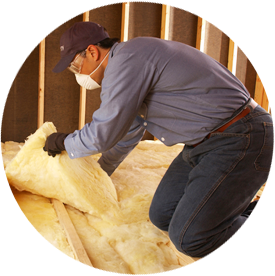In the market for spray foam insulation, but not sure of the difference between so-called “closed-cell” and “open-cell” foams, and which you should be looking at for your needs? We’ll take a close look at these two related but quite distinct insulation materials, and help you determine the ideal choice for your home or business.
What Are Closed-Cell Foam and Open-Cell Foam?
Let’s begin by defining these two terms. These two spray foams are both polyurethane foams, but they’re quite distinct from one another in physical properties due to a single difference:
- In closed-cell foam, each of the millions of cells or small bubbles in the foam is fully sealed and independent of the others.
- In open-cell foam, those small bubbles are interlinked.
This sounds like a minor change, especially since they’re both still polyurethane foams made up of a ton of little cells, but as we’ll see, this adds up to very big differences in performance and ideal applications.
R-Values
The first thing we want to look at with any insulating material, at least for thermal insulation, is R-value. If you’re unfamiliar with the term, R-value measures the resistance of a substance to heat flow, i.e., how good it is at insulating.
- Closed-cell foam wins handily on R-value alone, with values of around 6-7 per inch.
- Open-cell foam typically comes in at two-thirds or half that per inch.
So per inch of insulation, closed-cell foam is far more effective at making heat stay in or out of the place it’s insulating. Of course, there’s a lot more to insulation choices than raw R-values.
Density, Structure, and Expansion
Closed-cell foam is considered a medium-density insulating material, and it feels rigid and hard to compress with your hand. Open-cell foam is a low-density material you can probably squeeze into a ball without too much trouble, as the open cells allow you to squeeze air out of the structure.
This means that a layer of closed-cell foam ends up behaving almost like a thin layer of thick rubber wherever it is sprayed, while open-cell foam is more like a cushion. And the expansiveness of open-cell foam means it can’t be easily used in tight confines, like narrow walls in need of heavy insulation.
In fact, this difference ends up multiplying the advantage of closed-cell foam in many applications, as you can fit three layers of R-6 or R-7 closed-cell foam in the same space you would get a single R-3.5 layer of open-cell foam.
On the other hand, the way open-cell foam expands can allow it to more effectively fill difficult nooks and crannies, completely fill larger open spaces for soundproofing and sealing purposes, etc. In fact, it’s superior for soundproofing, as the dense nature of closed-cell foam makes it conduct sound relatively well, and any sound-dampening effect is minimal, whereas open-cell foam makes for excellent sound insulation.
Both foams also serve to create effective air barriers, but open-cell foam is moisture-permeable while closed-cell foam is not. For weatherproofing, this usually favors closed-cell, but some specific situations may better suit open-cell.
Application
These two forms of spray insulation are actually applied differently, which can also lead to differences in viable uses. Open-cell foam is easier to work with, and it can be sprayed in with simple water as a blowing agent. Closed-cell spray foam, on the other hand, requires specific chemicals — and in environments where those chemicals cannot be safely used, open-cell again pulls ahead.
How to Choose?
If none of the other differences is significant enough to make your decision for you before reaching the final point, then applying the significantly less expensive open-cell foam is probably a better choice. Otherwise, match your choice to your specific goals; there is no one-size-fits-all solution for insulation.
Need help choosing between open-cell and closed-cell spray foam for your residential or commercial property? Contact the experts at IBP of Nashville; we’ll help you determine the most effective material for your space.




